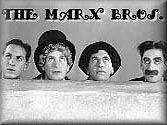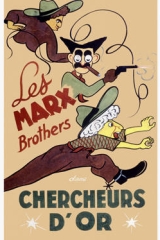ANIMAL CRACKERS

With Groucho Marx, Harpo Marx, Chico Marx, Zeppo Marx, Margaret Dumont, Louis Sorin, Lillian Roth, Margaret Irving, Robert Greig
Directed by Victor Heerman
Black and White
Reviewed by JL and JB
The Marx Brothers'
second film is an
example of
the sum of the parts being greater than the whole. The film
still
suffers a bit from the technical limitations of early talkies and it
has an unbearably plodding final 20 minutes, but ANIMAL CRACKERS
nevertheless overflows with classic and hilarious scenes. The
brothers (save for Harpo) seemed a bit tentative in their first screen
outing (THE
COCOANUTS) the year before, but here they fully live up to
their legend as the masters of comic anarchy. Groucho
delivers
what may be his best screen performance, with his character of Captain
Spaulding affording him the widest range for his comic gifts.
Harpo is at his most manic, nothing but pure instinct and impulse, and
Chico proves that obtuse belligerence can be charming. Even
Zeppo
gets a few laughs.  ½ - JL
½ - JL
 Director Victor
Heerman must have taken a
long, hard look at THE COCOANUTS (1929) before tackling the task of
directing the Marx Brothers second picture, ANIMAL CRACKERS (1930),
because he managed to avoid almost every mistake that Robert Florey and
Joseph Santley made on the first film. Florey and Santley
wanted
to make a faithful adaptation of a Broadway musical comedy, and to that
extent they succeeded. Victor Herman, on the other hand, decided that
what audiences wanted to see in a Marx Brothers picture was The Marx
Brothers, and so that is what he gave them. He cut out
all
of the music except the indispensable "Hooray for Captain Spaulding"
production and one love song. The few plot scenes he kept in, to move
the story
along, are brief, and usually have one or two Marx Brothers popping in
at the end.
Director Victor
Heerman must have taken a
long, hard look at THE COCOANUTS (1929) before tackling the task of
directing the Marx Brothers second picture, ANIMAL CRACKERS (1930),
because he managed to avoid almost every mistake that Robert Florey and
Joseph Santley made on the first film. Florey and Santley
wanted
to make a faithful adaptation of a Broadway musical comedy, and to that
extent they succeeded. Victor Herman, on the other hand, decided that
what audiences wanted to see in a Marx Brothers picture was The Marx
Brothers, and so that is what he gave them. He cut out
all
of the music except the indispensable "Hooray for Captain Spaulding"
production and one love song. The few plot scenes he kept in, to move
the story
along, are brief, and usually have one or two Marx Brothers popping in
at the end.
ANIMAL CRACKERS may not be the faithful
adaptation
of a Broadway hit that THE COCOANUTS was, but in allowing the Marx
Brothers to dominate the proceedings this time around, he made a film
that stands up much better, a vital if somewhat static and stage bound, classic.
Once again written by George Kaufman
and Morrie
Ryskind, ANIMAL CRACKERS established a great Marx Brothers tradition -
the buildup to Groucho's entrance, and the subsequent discovery, by the
audience if not by his co-stars, that he is a complete fraud.
Here, as Captain Spaulding, African Explorer, he arrives in a
sedan chair carried by four natives, and immediately argues about the
fare. "From Africa to here, a dollar eighty-five? I told you not to go
through Australia, you know it's all ripped up!" Later,
during
his lecture about his days in Africa, he unleashes a deathless joke:
"One morning, I shot an elephant in my pajamas. How he got in my
pajamas, I don't know." He makes no pretense at being anything but a
fraud and a liar, and his rich and clueless host (the indomitable
Margaret Dumont) can't see through him, or his greasepaint mustache.
Much of Groucho's charm (if you can call it that) is that, at
his
best, he lays his fraudulence on the table for everyone to see, and
people are so shocked at being fooled, they simply refuse to accept it.
Harpo and Chico contribute some great
scenes,
including one in which they play bridge with Dumont and Margaret
Irving. Chico has much of the same qualities as Groucho. "How
do
you want to play? Honest?", he asks Dumont before the game begins. In
another scene, when Mrs. Rittenhouse's daughter convinces Chico that a
sneaky favor she wants him to do is not really stealing, he leaves in a
huff. He'll only do a favor it means breaking the law.
Even the usually overlooked Zeppo has
one great
scene in ANIMAL CRACKERS. As Groucho dictates a letter to him, Zeppo
asks him absurd questions such as "How do you spell 'semi-colon?". Of course,
Groucho has an answer: "Make it a comma." One of Zeppo's
true
shining moments comes when Groucho asks him to read the letter back.
"You said a lot of things here that I didn't think were important," Zep
says to a stunned Groucho, "so I just omitted them."
The film does run out of steam before it actually
ends. It might be strange to say, but there may be too many
comedy
routines that pile up at the end of the film, all revolving around a
plot that not even Kaufman and Ryskind could take seriously.
However, that flaw aside , ANIMAL
CRACKERS
remains one of the
Marx Brothers funniest films.  -
JB
-
JB
(Review adapted from a previously published article - JB)
The Marx Brothers The Age of Comedy
ADD ANOTHER
QUOTE AND MAKE IT A
GALLON
"Quotes, unquotes and quotes."
"That's three quotes?"
"Yes, sir."
"Add another quote and make it a gallon."
Notes by John V. "Jay" Brennan
HERE'S GROUCHO
Groucho sings Kalmar and Ruby's "Hello, I Must Be Going", "The Captain is a Very Moral Man" and "Hooray for Captain Spaulding" with Zeppo and the cast.
A BOW FOR HARPO AND CHICO
Harpo's solo: "Why Am I So Romantic?" (Bert Kalmar, lyrics; Harry Ruby, music)
 Chico's solo: "I'm Daffy Over You" (Chico Marx, Sol Violinski) / "Silver
Threads Among the Gold" (H. P. Danks, music; Eben E. Rexford, lyrics)
Chico's solo: "I'm Daffy Over You" (Chico Marx, Sol Violinski) / "Silver
Threads Among the Gold" (H. P. Danks, music; Eben E. Rexford, lyrics)
Yes, that song that drives Groucho to offer Chico hush money was a Chico Marx original. It became a Marx motif, showing up as the theme tune of MONKEY BUSINESS, and popping up again in the HORSE FEATHERS soundtrack. It's a pretty little tune, but what makes it funny is the strident way Chico insists on playing it, and his reprisal of it whenever he can't think of anything else to play. And, of course, Groucho's numerous wisecracks hurled Chico's way ("If you get near a song, play it.") In Harpo's hands, of course, it becomes a thing of beauty in MONKEY BUSINESS, as he finds all kinds of harmonies and chords Chico probably couldn't even name (and to be honest, Harpo probably couldn't name them either).
"Silver Threads Among The Gold" was not written by Victor Herbert, despite Chico's insistence that on playing one of his own compositions "by Victor Herbert". As friend and author Matthew Coniam points out in THE ANNOTATED MARX BROTHERS, it is likely Chico played "Gypsy Love Song" on stage, which was a Herbert composition. However, in the film, the introductory joke is kept, but Chico opts for this song instead, by H. P. Danks and Eben E. Rexford. My thinking is that the switch in the movie occurred because Chico had already played "Gypsy Love Song" in the the film version of THE COCOANUTS. The switch makes it even funnier - Chico announces he will play a song he wrote, by Victor Herbert, and proceeds to play a song by neither he nor Herbert. Oh, that Leonard!
The above picture of Chico is an example of one of the things I love
to see in Marx Brothers movies: the cast sitting back and enjoying a
Chico or Harpo musical interlude. Other examples include the
musicians in MONKEY BUSINESS who seem to be having a great time
watching Harpo pull his gags while playing "O Sole Mio", and the ladies
in the background in THE BIG STORE, one of
whom turns around to hide her laughter during the Chico-Harpo piano
duet. I prefer these natural occurences over the staged ones,
such as the old immigrant lady whom we see through the strings of
Harpo's harp in A NIGHT AT THE OPERA.
Before the scene turns into an impromptu game of football, Harpo
seems
to be noodling around with "Some Of These Days" on the piano. If
so (and I could be wrong), "Some Of These Days" was written by Shelton
Brooks in 1910, and was covered by Sophie Tucker in 1911 and rerecorded
by her later, making it something of a personal theme song. Bing
Crosby also recorded a great jazzy version of it in 1931.
What Chico plays before "The Anvil Chorus" is anybody's guess.
"The Anvil Chorus" comes from the Guiseppe Verdi opera Il Trovatore,
which is the opera featured in A NIGHT AT THE OPERA.
PERSISTENT
TIGERS AND LEFT-HANDED
MOTHS
ANIMAL CRACKERS opened at the Forty-Fourth Street Theater in NYC on
October 23rd, 1928. It was the third and last Broadway show
the
Marx Brothers starred in, following I'LL SAY SHE IS (never filmed) and
THE COCOANUTS.
The movie version of ANIMAL CRACKERS was filmed at Paramount's studios
in Astoria, Long Island, New York. All subsequent Marx
Brothers
films were produced in Hollywood.
Robert Greig, who plays Hives the Butler, would also appear in the
Brothers' HORSE
FEATHERS as a biology professor, and was later a
standing member of director Preston Sturges' stock company.
The Bert Kalmar - Harry Ruby song "Hooray for Captain Spaulding" became
Groucho's theme song and was used in his TV quiz show You Bet Your Life.


